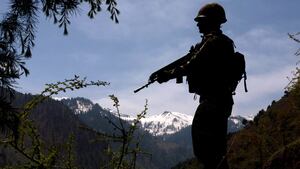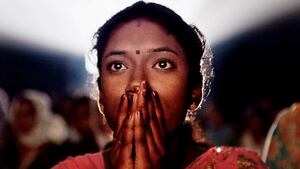Indian voters have just handed Prime Minister Narendra Modi’s party a landslide victory and Modi a second five-year term. How that happened is no mystery, and might be a cautionary example for other democracies around the world.
Modi launched his campaign on March 29. Well, officially, anyway.
Unofficially, he launched it a full month earlier, on February 26, when Indian Air Force planes crossed the India-Pakistan Line of Control and bombed Pakistani territory for the first time since 1971.
The sortie in question was a response to a suicide attack in Indian-administered Kashmir that had taken place 12 days earlier—the single deadliest such attack since 1989—which Modi blamed less on the Pakistan-based militant group that claimed responsibility for it than on Pakistan itself. (He didn't mention the fact that the bomber was an Indian-born Kashmiri.) The self-styled strongman promised a “jaw-breaking” response.
Pakistan's own prime minister, Imran Khan, adopted a firm though rather less bellicose tone when he warned against such action. He also noted, somewhat prophetically: “You are facing an election year. We believe that during the election, [you think] you will get a big boost if you 'teach Pakistan a lesson.'”
In the end, India didn't teach Pakistan much of anything: most analysts agree that Modi's airstrikes hit little of value, and, in the aerial tit-for-tat that followed, an Indian airman was captured (and very promptly released).
But Modi and the party he leads, the Bharatiya Janata Party (BJP), were cheered on by a chest-thumping media received their big boost all the same. Modi adopted "Chowkidar" (watchman or security guard) as his nickname and part of his Twitter handle.
Given numerous reports of Muslim and Dalit voters not appearing on the rolls, and given the death of a young Kashmiri boy at a polling booth in the first round of voting, it seems wrong to trot out the usual clichés: this was not a “celebration” or “festival” of democracy.
Nevertheless, after months of campaigning, and a whopping six weeks of voting, the largest democratic election in history is finally, mercifully over.
At the time of writing, the BJP looks set, not only to win the election, but to win it with an even greater majority than it did in 2014. This will be seen—unfortunately but correctly—as a victory for the politics of hate and division that Modi and the BJP have weaponized so successfully since coming to power five years ago.
Informed by Hindutva, the Hindu nationalist ideology that emerged around the same time as classical fascism and shares many of its key characteristics, Modi and the BJP believe that India is or should be an explicitly Hindu nation. During the campaign, BJP president Amit Shah announced that the party would “remove every single infiltrator from the country, except [Buddhists], Hindus, and Sikhs.”
For those who believe that India should strive towards the ideals of secular pluralism—towards the ideals espoused by the country's first post-independence prime minister, Jawaharlal Nehru, who appears more and more irrelevant by the day—the fact that a majority of voters appear to agree with Modi will come as a serious blow.
But it shouldn't come as much of a surprise. Even before the first exit polls were released last weekend—leading some true believers, desperately clutching at straws, to observe that these haven't always been accurate—there was a growing sense that Modi had the momentum behind him.
Or was it rather a sense that his opponents couldn't seem to muster any? From the Indian National Congress down, Modi's opponents bear a good deal of responsibility for his second term.
Despite a valiant last-ditch media blitz, during which he granted interviews in multiple languages, in every possible medium, to basically anyone who asked him, Congress leader Rahul Gandhi was never going to be able to take Modi on in a presidential-style head-to-head.
The inability of Congress to form a united front of national and regional parties—to form, in effect, an anti-Modi firewall—is arguably its crowning failure. (Of course, given the well-oiled nature of the BJP's political machine, such a firewall would have needed to have come online in the immediate aftermath of the last election.)
But I have a sneaking suspicion that even the most powerful firewall, put together by the brightest and most dedicated organizers in the country, might have failed to have much effect.
In one of his many interviews over the past month, Gandhi said something more insightful than I think even he properly knew. He described Modi as a “sentiment,” which is to say as something internalized, a state of mind.
Over the past five years, that sentiment—a sentiment, Gandhi said, “of anger and fear within people”—has become normalized in India. As with Trumpism in America, expressions of that sentiment, even manifestations of it, have become shockingly common and even more shockingly acceptable.
Acts of cow vigilantism, in which Hindu mobs attack mostly Muslim traders on the suspicion of selling beef or mistreating cattle, have increased exponentially year on year since Modi came to power. Crimes against Dalits and women are on the rise while convictions for those same crimes have gone down.
The situation in the Kashmir Valley, never good, has only gotten worse, culminating in India's incursion into Pakistani airspace three months ago and arguably bringing the world closer to nuclear war than we've been in quite some time.
(There have also been attacks on history and science, on education as a whole. An Agra court had to hear a stupid case about the Taj Mahal being a Hindu temple rather than a Mughal mausoleum.)
I mean, this is the country where an active terror suspect, Pragya Thakur, who remains accused of plotting a 2008 mosque bombing, can run as a candidate for major political party. (The party? Why, the BJP, naturally.)
This is the country where a candidate like Thakur—I've just this minute seen the news—can win.
Then again, this is also the country where a man who presided over the worst communal violence since partition—the 2002 Gujurat riots, which many believe Modi tacitly supported in his role as chief minister of the state—can be elected to the highest office in the land. Twice.
For anyone who believes, as I do, that the first five year's of Modi's government were merely a Hindutva test balloon, sent up into the smog above Delhi to see how far they could push things, today's saffron wave is more than bad news. It should scare the shit out of you.








